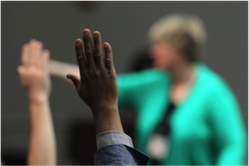As a ruling elder, you may have been asked, or will be asked, to moderate a committee or a meeting. For some of us who aren’t accustomed to leading meetings, this call seems frightening or overwhelming. Others of us regularly lead meetings at work or for the PTA or the neighborhood association, and we wonder if church meetings should be any different than those.
Here are some practical guidelines for moderating church meetings:
- Set a regular meeting day and time. Generally it works best if members of your committee or team can put the meeting schedule on their calendars at the beginning of the year. Sometimes it is tempting to move the meeting day/time in order to accommodate various members and their conflicts but that tends to create more issues than it solves.
- Find a meeting location. At the church, in someone’s home, or at a public location like a coffee shop? Each location has unique strengths and weaknesses. Think about what works best for your members and what location supports your ministry. An occasional meeting in someone’s home can nurture the sense of community for your group. If you are moderating the worship committee, consider sitting in the sanctuary for one of your meetings. If you are moderating the evangelism committee, consider gathering at a popular coffee spot in order to open your eyes to those around you.
- Remind your members about the meetings and their locations. This can be done by phone call, email, text message, or distributing a written calendar.
- Create an agenda for the meeting. Consider who should have input about what goes on that agenda. Should you check with the pastor or church staff? Should you ask committee members to send you agenda items in advance? Ideally the agenda can be sent to everyone ahead of time so they know what to expect they will be discussing.
The agenda can be organized in various ways. You can cover “old business” that has been previously discussed and is ongoing and then “new business” items. Or you can have reports from the members about their work since the last meeting. Be sure to have a timeline in mind for the meeting and to have a targeted ending time. A church committee meeting should be one to two hours in length to accomplish your work and to honor the time of those who serve. - Begin the meeting with some community building time. This might involve introducing yourselves to one another, or answering an easy “ice breaker” question, or checking in about how things are going in your lives. Questions like “when you were six, what did you want to be when you grew up?” or “what’s your favorite fall smell?” can be a way for members to get to know one another and create connections.

Photo by Michael Whitman
- Have a devotion. The devotion establishes the tone for this meeting as ministry, and not just another business meeting. As moderator, you can lead the devotion or you can rotate this among your members. A simple devotion is to read a short scripture passage, ask “what strikes you in this for our work together?” and then pray. Ideally select a scripture passage that connects with your committee’s work.
- You are the moderator. The word “moderate” means that you are the one responsible for facilitating the discussion, making sure that members have an opportunity to give input and to share insights. Each person on the committee is a member of the Body of Christ and brings unique gifts to your ministry together. As moderator, you are encouraging each person in his/her own ministry as part of the group.
- Arrange for someone take minutes or notes of the meeting. This might be one person’s role for the entire year or you might rotate this among your members.
- As the meeting draws to a close, review any decisions that have been made. What are the tasks to be done before the next meeting and who is doing them? Close the meeting in prayer, asking for God to guide you in your ministry together.
information provided here:
Please contact Martha Miller at martha.miller@pcusa.org and browse the Ruling Elders Web site.
The Reverend Dr. Millie Snyder earned degrees from Davidson College, Princeton Theological Seminary, and Columbia Theological Seminary. She has served congregations in Rochester Hills, Michigan, and in Matthews, North Carolina. Millie currently serves Myers Park Presbyterian Church in Charlotte, North Carolina, as executive pastor and is responsible for overall coordination and implementation of the church’s ministries. She is married and has two daughters, 17 and 14 years old.

